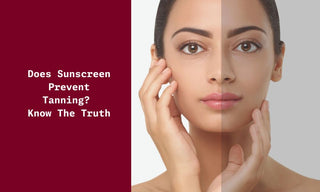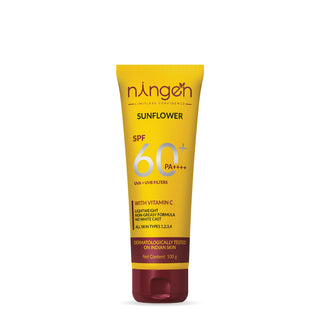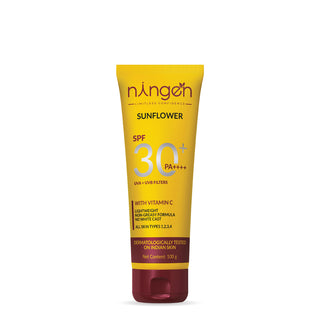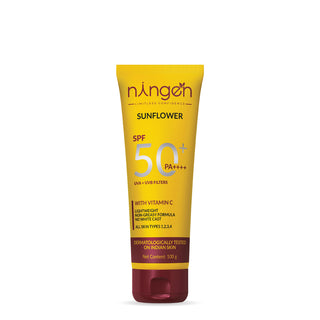Being outdoors is all about soaking up the sun. But with sunshine comes the inevitable concern: tanning.
Many of us use sunscreen to protect our skin from the sun's harmful rays, but does sunscreen prevent tanning? In this blog, we'll dive into how sunscreen works, what it can and can't do, and how to best use it to keep your skin healthy and glowing. Let's uncover the truth about sunscreen and tanning!
In This Article;
- Understanding Sunscreen
- Different Types of Sunscreen
- The Relationship Between Sunscreen and Tanning
- Sunscreen Ingredients That Help Prevent Tanning
- What is PA?
- The Importance of PA Rating in Skin Tanning
- Tips for Effective Sun Protection
- Final Thoughts
- TL;DR(Too Long;Didn't Read)
- Frequently Asked Questions
Understanding Sunscreen
Sunscreen is a crucial product in the realm of skincare, designed to protect the skin from the potentially harmful effects of the sun's ultraviolet (UV) radiation. Regular exposure to UV rays can lead to skin damage, premature aging, and an increased risk of skin cancers, making sunscreen an essential part of daily skincare routines, especially for those who spend significant periods outdoors. As our understanding of the sun's impact on the skin has grown, so has the development of sun protection products, evolving to offer a more comprehensive shield against the different wavelengths of UV radiation.
What is Sunscreen?
Sunscreen, also known as sunblock, is a lotion, spray, gel, or other topical product that absorbs or reflects some of the sun's ultraviolet (UV) radiation, helping protect the skin from sunburn and other skin damage. The effectiveness of sunscreen is measured by the Sun Protection Factor (SPF), which indicates the level of protection from UVB rays—responsible for sunburn. Broad-spectrum sunscreens are designed to protect against both UVA and UVB rays, the former of which can lead to deeper layers of skin damage and are linked to longer-term issues like premature aging and skin cancers.
How Does Sunscreen Work?
Sunscreen protects skin through a combination of physical and chemical properties. The active ingredients in sunscreens can be broadly categorized into two groups: chemical and physical (often called mineral sunscreens). Chemical sunscreens contain organic compounds like oxybenzone or avobenzone, which absorb UV radiation and convert it into a small amount of heat. On the other hand, physical sunscreens use natural minerals such as titanium dioxide or zinc oxide to create a physical barrier on the skin's surface, reflecting UV rays away from the skin. When applied correctly, Both types of sunscreens help mitigate skin damage and reduce the risk of skin cancer.
Different Types of Sunscreen
When it comes to protecting your skin from the sun’s harmful rays, choosing the right type of sunscreen is essential. Here’s a guide to the different types of sunscreens available to help you make an informed decision:
1. Chemical Sunscreens
Chemical sunscreens contain organic (carbon-based) compounds that absorb UV radiation and transform it into heat, which is then released from the skin. Common active ingredients include avobenzone, octinoxate, and oxybenzone.
Benefits:
- Lightweight and easy to apply.
- Often found in formulations that blend well with the skin, making them ideal for daily use and under makeup.
- Provides broad-spectrum protection by absorbing both UVA and UVB rays.
2. Physical (Mineral) Sunscreens
Physical sunscreens, also known as mineral sunscreens, contain active mineral ingredients such as zinc oxide or titanium dioxide. These ingredients sit on top of the skin and physically block or scatter UV rays.
Benefits:
- Less likely to cause skin irritation, making them suitable for sensitive skin.
- Provide immediate protection upon application.
- Generally considered safer for the environment, particularly marine life.
3. Hybrid Sunscreens
Hybrid sunscreens combine both chemical and physical UV filters. These formulations offer the benefits of both types, providing broad-spectrum protection with a blend of ingredients.
Benefits:
- Combines the cosmetic elegance of chemical sunscreens with the broad protection of physical sunscreens.
- Often formulated to address specific skin concerns, such as hydration or anti-aging.
4. Water-Resistant Sunscreens
Water-resistant sunscreens are designed to remain effective when the skin is exposed to water, such as during swimming or sweating. They are available in both chemical and physical formulations.
Benefits:
- Ideal for outdoor activities and sports.
- Provides reliable protection even when wet, though reapplication is still necessary after swimming or sweating.
5. Broad-Spectrum Sunscreens
Broad-spectrum sunscreens protect against both UVA and UVB rays. UVA rays can prematurely age the skin, causing wrinkles and age spots, while UVB rays can burn the skin. Too much exposure to both can increase the risk of skin cancer.
Benefits:
- Comprehensive protection against sunburn, premature aging, and skin cancer.
- Essential for overall skin health and effective sun protection.
6. Tinted Sunscreens
Tinted sunscreens are formulated with a slight color tint that can help even out skin tone and provide a cosmetic benefit in addition to sun protection. They are available in both chemical and physical formulations.
Benefits:
- Provides light coverage, similar to a foundation or BB cream.
- Helps to mask imperfections while protecting against UV rays.
- Suitable for daily wear and under makeup.
7. Spray Sunscreens
Spray sunscreens come in aerosol or pump bottles, making them easy to apply, especially for hard-to-reach areas. They are available in both chemical and physical formulations.
Benefits:
- Convenient and quick application.
- Ideal for use on large areas of the body and for reapplication on the go.
- Often preferred for use on children and active individuals.
8. Stick Sunscreens
Stick sunscreens are solid and come in a stick form, similar to a deodorant. They are convenient for targeted application on specific areas of the face and body.
Benefits:
- Easy to apply precisely to areas like the face, ears, and nose.
- Less messy and great for on-the-go touch-ups.
- Often formulated to stay put, making them ideal for sports and outdoor activities.
Choosing the Right Sunscreen is Important
When selecting a sunscreen, consider your skin type, lifestyle, and specific needs. For example, those with sensitive skin may prefer physical sunscreens, while athletes might opt for water-resistant options. Always look for broad-spectrum protection and an SPF of 30 or higher for optimal defense against harmful UV rays.
By understanding the different types of sunscreens available, you can better protect your skin and enjoy your time in the sun with confidence.
The Relationship Between Sunscreen and Tanning
Sunscreen serves as a guard against the sun's intense UV rays, playing an essential role in skin protection. However, one question that arises with the use of sunscreen is its impact on the tanning process. Tanning is the skin's response to UV exposure, wherein it produces more melanin to protect the deeper layers of skin cells from damage.
While many people aspire to achieve a bronzed look through tanning, it's important to consider the health implications tied to UV exposure. Understanding the relationship between sunscreen and tanning involves recognizing how sunscreen works to protect the skin, the different sunscreen options available, and how they can affect the skin's tanning ability.
Does Sunscreen Prevent Tanning?
To a great extent, sunscreen can prevent tanning. When appropriately applied, sunscreen shields the skin by absorbing, reflecting, or scattering sunlight, thereby reducing the amount of UV radiation that penetrates the skin. This results in less melanin production and, consequently, less tanning. Broad-spectrum sunscreens, which protect against both UVA and UVB rays, are the most effective at impeding the tanning process since they address the full spectrum of UV radiation that contributes to skin tanning and damage. However, no sunscreen can block 100% of UV rays, meaning some tanning can still occur even when using sunscreen. Additionally, many factors, such as the Sun Protection Factor (SPF), frequency of reapplication, and the amount of sunscreen applied, can influence the degree of tanning experienced.
Factors That Affect Tanning While Using Sunscreen
Several factors impact the efficacy of sunscreen in preventing tanning:
- SPF Rating: Higher SPFs offer stronger and longer-lasting protection, reducing the likelihood of tanning.
- Broad-Spectrum Coverage: Sunscreens that only protect against UVB rays may not prevent tanning caused by UVA rays effectively.
- Proper Application: Inadequate or uneven application can lead to less protection and more tanning.
- Reapplication Frequency: Sunscreen needs to be reapplied at least every two hours or immediately after swimming or excessive sweating.
- Amount Used: Using too little sunscreen reduces the level of protection, thereby allowing more UV radiation to induce tanning.
- Type of Activity: Activities that cause more sweating or involve water may decrease the effectiveness of sunscreen over time.
- Individual Skin Type: People with lighter skin tones may tan more easily, even with sunscreen, while those with darker skin may experience less noticeable tanning.
- Time of Day: UV radiation is most intense during peak hours of sunlight, typically from 10 AM to 4 PM, resulting in more effective tanning during these times.
By considering these factors and being diligent about sun protection practices, individuals can more effectively manage their tanning while maintaining a commitment to skin health.
Does Sunscreen Completely Block UV Rays?
It's crucial to note that no sunscreen, regardless of its strength, can completely block all UV rays. Broad-spectrum sunscreens are formulated to protect against a broad range of UVA and UVB rays, yet even the most robust sunscreens with high SPFs are not able to provide total sun blockage. SPF ratings indicate the fraction of UVB radiation that reaches the skin. For example, SPF 30 allows about 1/30th of UVB rays to hit the skin, which translates to approximately 3% of UVB rays and an efficacy of blocking roughly 97%. Therefore, while the use of sunscreen is highly effective at reducing the intensity of UV radiation exposure, some UV rays can still penetrate the sunscreen, leading to potential skin damage and a mild tanning effect.
Sunscreen Ingredients That Help Prevent Tanning
1. Zinc Oxide
- How it works: Zinc oxide is a mineral sunscreen that provides broad-spectrum protection by reflecting and scattering UV rays away from the skin.
- Benefits: It is effective against both UVA and UVB rays, making it a reliable ingredient for preventing tanning and sunburn.

2. Titanium Dioxide
- How it works: Similar to zinc oxide, titanium dioxide is another mineral sunscreen that works by reflecting and scattering UV radiation.
- Benefits: It provides broad-spectrum protection and is gentle on the skin, making it suitable for sensitive skin types.

3. Avobenzone
- How it works: Avobenzone is a chemical sunscreen that absorbs UVA rays, preventing them from penetrating the skin.
- Benefits: It is one of the most effective ingredients for broad-spectrum protection, particularly against UVA rays that contribute to tanning and aging.
4. Octocrylene
- How it works: Octocrylene absorbs UVB and short UVA rays, converting them into less harmful energy (heat).
- Benefits: It stabilizes other sunscreen ingredients like avobenzone, enhancing their effectiveness and providing broad-spectrum protection.
5. Homosalate
- How it works: Homosalate absorbs UVB rays, which are primarily responsible for sunburn and contribute to tanning.
- Benefits: It helps protect the skin from the immediate damage of UVB exposure, reducing the risk of sunburn and tanning.
6. Octinoxate
- How it works: Octinoxate absorbs UVB rays, converting them into less harmful energy.
- Benefits: It helps prevent sunburn and tanning by blocking UVB rays.
7. Oxybenzone
- How it works: Oxybenzone absorbs both UVA and UVB rays, offering broad-spectrum protection.
- Benefits: It helps prevent tanning and sunburn by blocking a wide range of UV radiation.
8. Mexoryl SX and Mexoryl XL
- How it works: These are chemical sunscreen ingredients that provide broad-spectrum protection by absorbing both UVA and UVB rays.
- Benefits: They are known for their stability and effectiveness in preventing tanning and protecting against sunburn.
9. Ecamsule (Mexoryl SX)
- How it works: Ecamsule absorbs UVA rays, providing strong protection against the rays that cause tanning and aging.
- Benefits: It offers broad-spectrum protection and is often combined with other UVB-absorbing ingredients for comprehensive sun protection.
10. Tinosorb S and Tinosorb M
- How it works: These are broad-spectrum sunscreen ingredients that absorb, reflect, and scatter both UVA and UVB rays.
- Benefits: They are highly effective in preventing tanning and sunburn, and are stable under sunlight.
What is PA?
PA" in sunscreen stands for "Protection Grade of UVA." It is a rating system developed in Japan to indicate the level of protection a sunscreen offers against UVA rays, which are primarily responsible for skin aging and tanning. The PA rating is based on the Persistent Pigment Darkening (PPD) method, which measures how long it takes for the skin to tan after being exposed to UVA light.
PA Rating System
The PA rating system uses plus signs (+) to indicate the level of UVA protection:
- PA+: Provides some UVA protection.
- PA++: Provides moderate UVA protection.
- PA+++: Provides high UVA protection.
- PA++++: Provides very high UVA protection.
When choosing a sunscreen, it's important to look for a high SPF and PA rating to ensure broad-spectrum protection against both UVA and UVB rays. This helps in effectively preventing sunburn, tanning, and long-term skin damage.
The Importance of PA Rating in Skin Tanning
When it comes to protecting your skin from tanning, the PA rating in sunscreen plays a crucial role. The PA rating measures the level of protection a sunscreen offers against UVA rays, which are primarily responsible for tanning and long-term skin damage. Here’s why the PA rating is important for preventing skin tanning:
1. UVA Rays and Tanning
UVA rays penetrate the skin more deeply than UVB rays and are the main culprits behind tanning. They stimulate the production of melanin, the pigment responsible for darkening the skin. Sunscreens with a high PA rating effectively block these rays, reducing the likelihood of tanning.
2. Comprehensive Sun Protection
A sunscreen with a high PA rating offers broad-spectrum protection. This means it guards against both UVA and UVB rays. While UVB rays cause sunburn, UVA rays cause tanning and contribute to skin aging. Choosing a sunscreen with a high PA rating ensures that you’re protected from the full spectrum of harmful solar radiation.
3. Prevention of Uneven Skin Tone
Regular exposure to UVA rays without adequate protection can lead to uneven skin tone and hyperpigmentation. A high PA rating helps maintain an even skin tone by preventing the overproduction of melanin in certain areas, which can result in dark spots and patches.
4. Long-Term Skin Health
Consistent protection against UVA rays not only prevents tanning but also protects your skin’s health in the long term. It reduces the risk of photoaging, which includes wrinkles, fine lines, and leathery skin texture. By choosing a sunscreen with a high PA rating, you’re investing in the long-term health and appearance of your skin.
5. Enhanced Effectiveness
For those who are particularly prone to tanning or have fair skin, a high PA rating is essential. It enhances the effectiveness of the sunscreen in shielding the skin from UVA-induced pigmentation and ensures that your skin remains fairer and more radiant.
Applying Sunscreen Correctly and Reapplying During Outdoor Activities to Prevent Tanning
A robust sun protection routine extends beyond the initial application of sunscreen. Applying it correctly is crucial:
- Use an ounce of sunscreen (enough to fill a shot glass) for full coverage.
- Cover all exposed skin, including often-missed spots like the tops of feet, ears, and back of the neck.
- Apply sunscreen 15 minutes before heading outdoors to allow it to bind to your skin.
Tips for Effective Sun Protection
When it comes to safeguarding our skin from the sun's rays, layering our defenses maximizes protection. Sunscreen is a key player, but it's not infallible on its own. Integrating additional measures can dramatically enhance the overall effectiveness of sun protection and minimize the risk of sun damage. Here’s a rundown of strategic actions that one can adopt for a more comprehensive approach to sun safety.
Wearing Protective Clothing and Wide-Brimmed Hats
Clothing is your first line of defense against solar radiation. Long-sleeved shirts and long pants made from tightly woven fabrics can shield your skin. For optimal protection, choose items with an Ultraviolet Protection Factor (UPF) label – UPF 50 fabric blocks 98% of UV rays.
Don’t overlook your headwear – a wide-brimmed hat not only provides shade for your face but also covers other vulnerable areas like your neck and ears. When selecting sunglasses, opt for wraparound styles with 100% UVA and UVB protection to safeguard your eyes and the surrounding skin.
Avoiding Peak Sun Hours and Seeking Shade
The sun's intensity peaks between 10 a.m. and 4 p.m. To minimize your UV exposure, it’s prudent to plan outdoor activities outside these hours. If you must be outdoors during peak times, seeking shade is a sensible strategy. Whether it’s finding respite under a tree, umbrella, or canopy, make shade your ally.
Reapplication is just as important as initial application. Reapply every two hours and immediately after swimming, sweating, or towel drying. If you’re engaging in sports or high-energy activities, consider a water-resistant formula to match your level of activity.
Note: Learn how to apply sunscreen on face. Click on the link.
Final Thoughts
Thank you for reading our article on “Does Sunscreen Prevent Tanning? Know The Truth”. Sunscreen is an essential tool for protecting your skin from the harmful effects of the sun. While it can significantly reduce tanning by blocking UVA and UVB rays, no sunscreen can completely prevent it. By understanding how sunscreen works and choosing the right type for your needs, you can better protect your skin, prevent tanning, and maintain your skin's health and appearance. Remember to apply it correctly, reapply frequently, and use additional protective measures for the best results.
Quick View
Does sunscreen prevent tanning? Mostly, yes. Sunscreen helps protect the skin from harmful UV rays, which cause tanning and long-term skin damage. However, no sunscreen can block 100% of UV rays, so some tanning may still occur. To minimize tanning, use broad-spectrum sunscreens with high SPF and PA ratings, apply generously, and reapply frequently. Additionally, complement your sun protection with protective clothing and by avoiding peak sun hours.
Frequently Asked Questions
Q1. Does sunscreen completely prevent tanning?
No, sunscreen does not completely prevent tanning. It significantly reduces UV exposure, thereby decreasing melanin production and the extent of tanning. However, some UV rays can still penetrate the sunscreen, causing mild tanning.
Q2. What is the difference between UVA and UVB rays?
UVA rays penetrate deeper into the skin and are primarily responsible for premature aging and tanning. UVB rays affect the skin's surface, causing sunburn and contributing to skin cancer. Broad-spectrum sunscreens protect against both types.
Q3. How often should I reapply sunscreen?
Sunscreen should be reapplied every two hours and immediately after swimming, sweating, or towel drying. Consistent reapplication ensures continuous protection from UV radiation.
Q4. What does SPF mean?
SPF stands for Sun Protection Factor, indicating the level of protection from UVB rays. For example, SPF 30 allows about 1/30th of UVB rays to reach the skin, meaning it blocks approximately 97% of UVB radiation.
Q5. What is the PA rating in sunscreen?
The PA rating indicates the level of protection against UVA rays. It uses a system of plus signs (+) with PA+ providing some protection and PA++++ offering the highest level of protection against UVA rays.
Q6. Can I tan through a window or on a cloudy day?
Yes, UVA rays can penetrate windows and clouds, so it is possible to tan or get sunburned under these conditions. Wearing sunscreen daily, even indoors or on overcast days, is advisable for optimal protection.
Q7. What is the difference between chemical and physical sunscreens?
Chemical sunscreens contain organic compounds that absorb UV radiation and convert it to heat. Physical sunscreens use minerals like zinc oxide and titanium dioxide to reflect and scatter UV rays. Both types are effective, but physical sunscreens are less likely to cause skin irritation.
Q8. Is sunscreen necessary for dark skin tones?
Yes, people with dark skin tones also need sunscreen. While they may have more natural protection due to higher melanin levels, they are still at risk for skin damage, premature aging, and skin cancer from UV exposure.
Q9. What should I look for in a good sunscreen?
Choose a broad-spectrum sunscreen with an SPF of 30 or higher and a high PA rating. Consider your skin type and lifestyle, opting for water-resistant formulas if you sweat a lot or engage in water activities.
Q10. Does makeup with SPF provide enough protection?
Makeup with SPF can provide some protection, but it may not be sufficient on its own, especially if not applied in adequate amounts. It’s best to use a dedicated sunscreen under your makeup for comprehensive protection.











